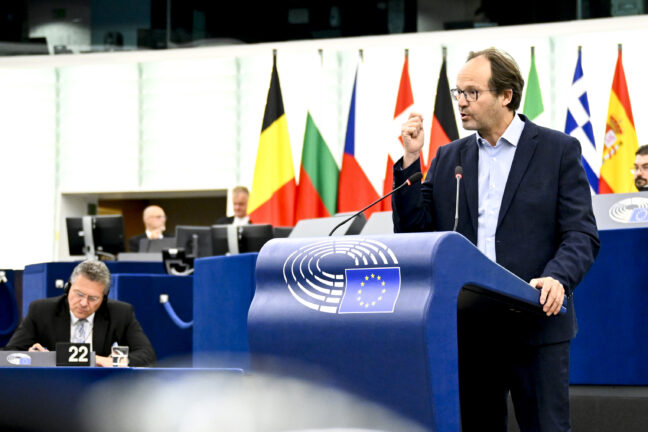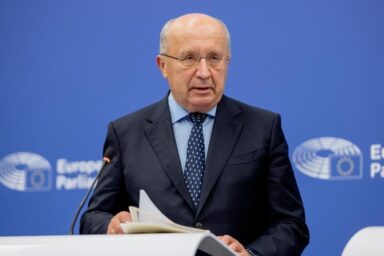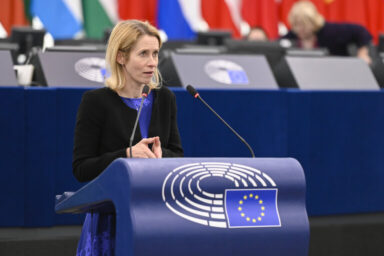The European Parliament’s debate on strengthening the rule of law’s link to EU budget safeguards broadly supported the status quo. Incremental reforms saw some criticism for both slow progress and—from the fringes—for their very existence. Fiery Hungarian and Polish MEPs‘ arguments introduced some accidental irony into the debate.
The Committee on Budgets (BUDG) and the Committee on Budgetary Control (CONT) considered on 1 September 2025 the draft BUDG-CONT own-initiative report on the “implementation of the rule of law conditionality regime”. In the draft, the co-rapporteurs Jean-Marc Germain (S&D/FRA) and Monika Hohlmeier (EPP/DEU) provide their assessment of the implementation of the rule of law conditionality regulation five years into its application and make recommendations for its future implementation.
Too early for a revision
The conditionality regulation seeks to protect the financial interests of the Union by enabling the EU to suspend funding to member states that violate rule of law principles when such breaches impact the EU budget. The draft implementation report highlights the role of this mechanism as a core pillar for the protection of the Union budget but also points to various shortcomings that should be addressed. In particular, it calls for a closer connection of the mechanism to the findings of the Commission’s annual rule of law reports..
Mr Germain opened by rejecting calls for overhauling the 2022 conditionality regulation—which allows freezing EU funds over rule-of-law breaches—arguing implementation flaws, not legal gaps, are the core issue. “We do not call for a revision of the regulation because we think it’s too early for that. However, we believe some aspects of the application should be better.”
The co-rapporteur stressed the need to clarify overlaps between the conditionality mechanism, Recovery and Resilience Facility (RRF) milestones, and horizontal enabling conditions,” Mr Germain said. He warned that frozen funds risk misallocation if member states ignore remedial obligations. “The EU budget is not neutral to breaches of democracy and fundamental rights…smart conditionality must guarantee support reaches those who depend on it most,” he said.
You might be interested
Reclaiming misused funds
Ms Hohlmeier echoed this caution, praising the regulation’s “positive effects” despite initial resistance but demanding stricter enforcement protocols. “Proportionality and transparency are very important…we have to connect the breaches to the risk to the budget.” She cited cases where companies faced fund withdrawals because of disagreeing with their governments’ policies, and called for clearer “standards and procedures” for reclaiming misused RRF cash.
“We can’t have a situation where there’s no procedure to retrieve funds two years down the line,” Ms Hohlmeier said. She also criticised the Commission’s sluggish information-sharing with MEPs: “Parliament is the last to get the information after the press—I don’t think that’s appropriate.”
Proportionality and transparency are very important…breaches have to be connected to the risk to the budget. — MEP Monika Hohlmeier (EPP/DEU)
The Hungarian contribution lived up to the speaker’s credentials. Tamás Deutsch (PfE/HUN), who hails from Viktor Orbán’s Fidesz, launched a combative rebuttal of any notion of tying the rule of law to Brussels money, framing the idea as a mechanism of anti-democratic coercion.
Historical mistakes
“We Hungarians do not want to live like you do. We reject your moral superiority…the EU cannot dictate how we should live.” Dismissing rule-of-law critiques as “institutional lies”, he defended Hungary’s “Christian state” identity and rejection of “LGBTQ culture”, accusing Brussels of seeking regime change. “You want your own people in government in Hungary…your historical mistakes are not something we want to follow.”
The following speaker, Bogdan Rończa (ECR/PLN), unwittingly brought an element of irony. He spoke in favour of what Mr Deutsch had condemned, even as they both essentially bashed all things Brussels. Mr Rończa, whose eurosceptic PiS party is currently in opposition, pivoted to alleged corruption under Poland’s current government.
You want to create a culture of denunciation…this is an exercise in Hungary-bashing, a covert tyranny. — MEP Alexander Jungbluth (ESN/DEU)
Mr Rończa claimed that EU recovery funds now bankroll “yachts and coffee shops” for allies of Polish Prime Minister Donald Tusk. “European journalists have already taken note…the truth must prevail.” He lamented Poland becoming “the laughing stock of the whole world” and urged OLAF investigations, though he provided no ground for formal probes.
Inconsistent enforcement
Moritz Körner (Renew/DEU) challenged the co-rapporteurs’ incrementalism, arguing the Commission’s inconsistent enforcement—citing Hungary’s €10bn release despite documented discrimination against EU firms—demands regulatory revisions. “We need an actual revision to ensure consistent application…Parliament must be on equal footing with the Commission and Council.” He pledged amendments to unify the rule-of-law toolbox under the conditionality framework.
Rasmus Nordqvist (Greens-EFA/DNK) backed tighter links between the mechanism and annual rule-of-law reports but urged post-2027 budget considerations. “We need strong rules that are actually used…to keep up the common rules we have in our union.” Alexander Jungbluth (ESN/DEU) dismissed the report as a “Hungary-bashing” exercise, alleging hypocrisy given Germany’s own democratic “restrictions” cited in a U.S. State Department report. “You want to create a culture of denunciation…this is a covert tyranny.”
We are not dictating how Hungarians should live—we’re demanding respect for the rule of law they signed up to when joining the EU. — MEP Jean-Marc Germain (S&D/FRA)
Thomas Geisel (NI/DEU) questioned ceding oversight to the Commission, citing its refusal to disclose vaccine-procurement texts. “Funds authorised by Parliament shouldn’t be withheld without our scrutiny…the Commission doesn’t always respect the rule of law.”
Procedures matter
Michał Wawrykiewicz (EPP/PLN), rapporteur for the LIBE committee, stressed procedural flaws over five years of implementation. “The Commission has failed to apply the regulation in a timely manner…OLAF findings were ignored in all but one case.” He echoed Mr Germain’s “smart conditionality” push to shield end beneficiaries from political reprisals, warning that without safeguards, “local authorities and entrepreneurs pay the price for central governments’ misconduct.”
In closing, Mr Germain rebuked Mr Deutsch’s sovereignty rhetoric. “We are not dictating how Hungarians should live—we’re demanding respect for the rule of law they signed up to when joining the EU.” He conceded Parliament’s limited judicial role but vowed tighter scrutiny: “Decisions must be transparent…we’ll debate whether the regulation itself needs changing.”
Ms Hohlmeier dismissed claims of anti-Hungarian bias, noting the mechanism applies to all states. “It’s about protecting freedoms—independent judges, free media—not targeting governments. Without these, there’s no way to seek justice or protect the budget.”
Fragile equilibrium
The debate underscored the conditionality regulation’s fragile political equilibrium—too blunt for critics, too timid for reformers—as the EU grapples with enforcing shared values without fuelling perceptions of overreach. With amendments pending and Commission guidance still evolving, the path to “smart conditionality” remains as contested as ever.
The matter is to face a plenary debate in this coming December.











